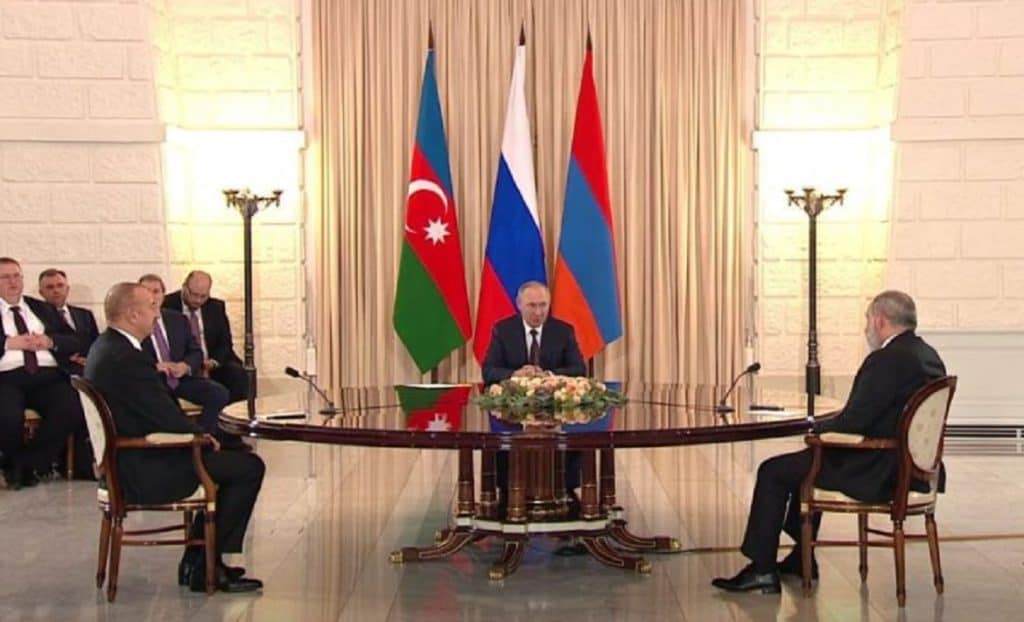By Nikola Mikovic
While Armenia and Azerbaijan seek to normalize their relations, Russia hopes to preserve its influence in the South Caucasus. Other foreign actors, namely the United States and the European Union, seem to use Moscow’s preoccupation with the Ukraine war to increase their presence in the strategically important region.

The South Caucasus has traditionally been in Russia’s geopolitical orbit. Over the past three decades, the Kremlin has been playing the role of a mediator in various disputes between Armenia and Azerbaijan. But since the Donbass conflict escalated and led to the full-scale war between Russia and Ukraine, the EU and the US have started attempting to portray themselves as major regional arbiters. When the cat’s away, the mice will play.
This year, Armenian Prime Minister Nikol Pashinyan and Azerbaijani President Ilham Aliyev have met several times in Brussels, and their foreign ministers once in Washington, trying to reach a lasting peace agreement. Although the two nations are reportedly very close to signing a deal, to this day it remains unclear if Yerevan and Baku will manage to resolve some crucial issues such as border demarcation between Armenia and Azerbaijan, as well as unblocking of regional transport routes any time soon.
On October 31, this time in Russia’s Black Sea resort of Sochi, Pashinyan and Aliyev once again met to discuss a potential peace agreement. The meeting seems to have been more important for their host, Russian President Vladimir Putin, than for the two leaders. The Sochi trilateral summit helped Russia to partially restore its positions in the South Caucasus, although no document that would permanently end hostilities between Armenia and Azerbaijan has been signed.
Still, Putin, Pashinyan and Aliyev have managed to agree on a joint statement that confirms the role of Russia as a mediator, as well as the status of the Russian peacekeepers that have been deployed to Nagorno-Karabakh in 2020, following the 44-day war that the two archenemies fought over the mountainous region. However, the joint statement does not mention Nagorno-Karabakh itself, but rather states “Russian peacekeepers in the Transcaucasus”, which is not surprising since Azerbaijan, as the clear winner of the 2020 war, insists that the status of the territory has been resolved.
Prior to the meeting, Pashinyan said that Armenia is ready to sign a trilateral agreement with Russia and Azerbaijan on extension of the mandate of the Russian peacekeepers in Nagorno-Karabakh for up to 20 years. But given that Nagorno-Karabakh is internationally recognized as part of Azerbaijan, it is Baku, rather than Yerevan, that has to agree to continue hosting Russian troops. Their mandate expires in 2025, and at this point it is too early to predict if Azerbaijan will decide to allow them to stay in the region. Such a decision will likely depend on Russia’s geopolitical position in 2025, and also on the outcome of the Ukraine conflict.
For the Kremlin, probably the most important aspect of the Sochi summit is the fact that Pashinyan and Aliyev have agreed that it is Russia that will provide “all possible assistance in finding a solution that will satisfy both sides of the conflict”. In other words, Yerevan and Baku will continue negotiating under the Russian auspices. That, however, does not mean that the West will stop attempting to increase its presence in the South Caucasus. The EU and the US will almost certainly continue pushing the two leaders to sign a peace deal in Brussels, rather in in Moscow, which would symbolically mean that the Western policy regarding the South Caucasus has prevailed over Russia, and that Armenia and Azerbaijan no longer see the Kremlin as the major arbiter in the region.
But the very fact that Pashinyan and Aliyev accepted Putin’s invitation to come to Sochi suggests that the battle for influence in the South Caucasus between Russia and the West is far from over. From the Russian perspective, the atmosphere for future agreements has been created. The Kremlin will undoubtedly seek to contribute to the preparation for the signing of a peace treaty between Azerbaijan and Armenia, although it is highly uncertain when and where a deal will be signed. More importantly, there is no guarantee that Baku and Yerevan will implement the Sochi document and “refrain from the use of force and the threat of its use”.
Thus, for the foreseeable future, the situation in the turbulent region will likely remain tense. Russia, as well as other global and regional actors, will continue pushing the two archenemies to implement at least parts of the Moscow-brokered 2020 ceasefire agreement, namely those points that regulate the unblocking of the transportation corridors in the region. But that issue is also a matter of political disputes between Armenia and Azerbaijan, which means that their leaders will have to continue holding summits, be it in Russia or in the West.
One thing is for sure: the United States and the European Union will try their best to crowd Russia out of the South Caucasus. But the Kremlin is unlikely to easily give up its positions in the region. Therefore, the Russo-Western diplomatic battle for Armenia and Azerbaijan will go on.
Author: Nikola Mikovic (Journalist, researcher and analyst based in Serbia. He covers mostly the foreign policies of Russia, Belarus and Ukraine)
(The views expressed in this article belong only to the author and do not necessarily reflect the views of World Geostrategic Insights).







